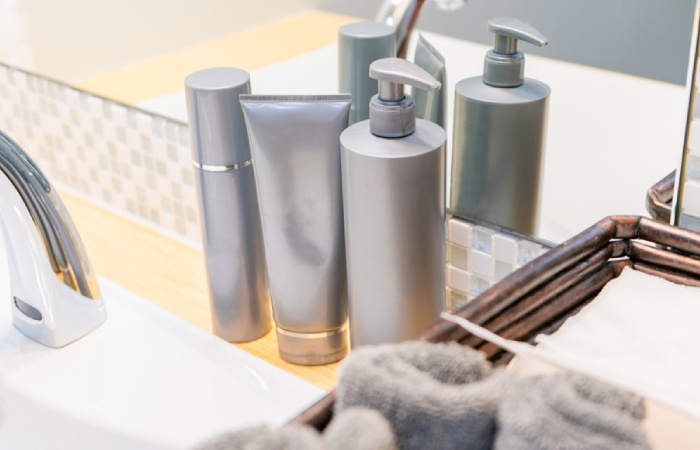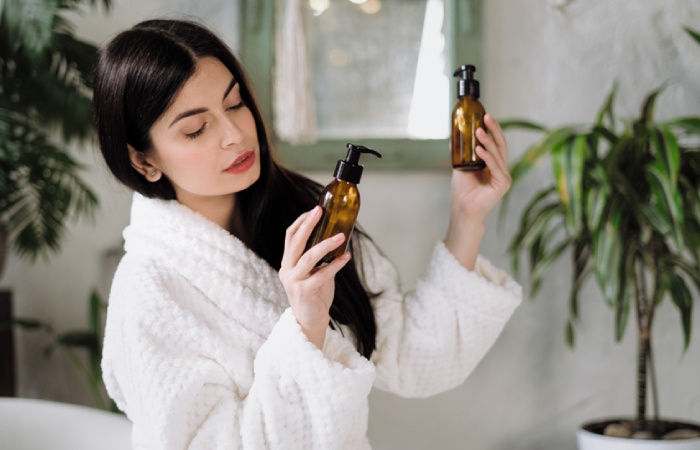Drugstore vs. High-End Skincare – With all the options on the market, choosing between drugstore and high-end skincare can be tough, especially if you are on a budget and can’t splurge on every new skin tightening cream that launches. We’ll explain what drugstore and high-end skincare are, what factors affect the cost of skincare products, and how to choose between drugstore vs. high-end skincare.
Table of Contents
What is Drugstore Skincare?
Drugstore skincare is (you guessed it) the tier of skincare products that is normally sold at drugstores, pharmacies, grocery stores, and retailers such as Target. Drugstore skincare products are normally on the more affordable end of the spectrum, though prices have been rising over the years due to inflation and other factors. In some cases, the prices for more expensive drugstore skincare may be equal to or more than lower-end department store offerings! Drugstore skincare products typically achieve these lower prices through less advanced formulations, simpler packaging, and mass production.
What is High-End Skincare?
High-end skincare typically refers to the level of skincare that is available at department stores and premium beauty retailers such as Sephora. They typically cost more than drugstore skincare products but offer more advanced formulations, better quality ingredients, nicer packaging, and other features to justify the price. Many people start out using drugstore skincare and graduate to higher-end skincare products once they understand what works for their skin.
What affects the Price of a Skincare Product?
Many different factors affect the price of a skincare product, and it’s not always apparent why a drugstore dupe costs less than its higher-end counterpoint. Here are eight factors to consider when deciding whether a skincare products is worth the splurge or not:
Ingredient Quality
Most drugstore skincare products rely on widely available, cheaply sourced ingredients to help keep prices down. High-end skincare products typically incorporate more premium ingredients that may be more difficult to source or have a limited supply, which drives up the price in turn.
Ingredient Concentration
Ingredient quality isn’t the only factor you need to consider; you also need to look into ingredient quantity. Plenty of drugstore products claim to incorporate higher-end ingredients, but if you look at the label they’ll be listed last, meaning that there is only a very tiny percentage of them in the product. High-end skincare products typically contain greater quantities of these ingredients, meaning that you’ll see results faster.
Research and Development
Beauty companies incur a lot of expenses researching and developing new ingredients and new products like anti-aging creams and sunscreens. They typically pass some of these expenses on to the consumer in the form of higher prices. Meanwhile, drugstore skincare companies usually focus on their core lines and launch new products less frequently due to the costs associated with these new product launches.
Testing
Testing skincare products to ensure that they are safe and stable is another cost that must be passed along to the consumer. The more new products that a brand launches or updates, the more testing that they must perform. Additional testing is also required if the brand wants to expand into new international markets in order to comply with different country laws.
Production Scale
The more units a brand can sell, the more they can lower the cost per unit. Because drugstore brands sell such a large volume or product, these economies of scale lower the prices overall. Higher-end skincare brands that sell less product don’t get the same cost benefit due to the lower volume.
Packaging
Packaging plays an integral part not just in branding a product but also in keeping the formulation shelf stable. Fancy packaging that is made of glass or metal or which incorporates special seals to keep the product stable will cost more than a plain plastic jar.

Marketing
Marketing individual products, as well as the overall brand, adds to overall costs. Drugstore brands usually don’t splurge in influencer trips, magazine ads, and free sample programs, whereas higher-end brands will invest in these marketing campaigns.
Other Expenses
Skincare brands also have other expenses just like any other business, including salaries, rent, and taxes. These costs are reflected in the final prices of their products.
Should you choose Drugstore vs. High-End Skincare?
Now that you understand the difference between drugstore and high-end skincare, you’re probably wondering whether or not it’s worth it to spend the extra money on high-end skincare. If you’re not on a budget, there’s really no reason not to buy nicer skincare products since they are typically more effective and feature more advanced ingredients. But what if you are on a budget? How can you prioritize which products to splurge on and which to save on?

The general wisdom is to choose higher-end options for your serums, chemical peels, sunscreens, and similar products. That’s because these active ingredients require a lot of R&D and testing to get right, so a higher-priced product typically equals a more effective one. If you need to save money in other areas, there are lots of solid drugstore options for facial cleansers and moisturizers that are available at a lower price.
One thing that’s important to remember about drugstore products is that you often can’t sample them before purchase. Depending on the retailer you purchase the drugstore products from, you might not be able to return them if you’ve already opened them either. This contrasts with higher-end skincare products, which are usually available as samples so you can test them before purchasing and which also come with a generous return policy. If you buy a lot of drugstore products you don’t use up, it might be more expensive in the long run when compared to sampling higher-end skincare and then splurging on your top choice.
We hoped this guide cleared up the differences between drugstore and high-end skincare! What products do you save on and which do you splurge on? Let us know in the comments below!

